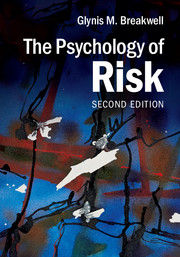Book contents
- Frontmatter
- Dedication
- Contents
- List of figures
- List of boxes
- Preface to the second edition
- Acknowledgements
- 1 A social psychological framework for analysing risk
- 2 Hazard perception
- 3 Individual and group differences in risk perception
- 4 Decision-making about risks
- 5 Risk and emotion
- 6 Risk communication
- 7 Errors and accidents; emergencies and disasters
- 8 Risk management; risk in complex systems
- 9 Social amplification, social representations and identity processes
- 10 Changing risk reactions: lessons from the psychology of risk
- References
- Index
5 - Risk and emotion
Published online by Cambridge University Press: 05 October 2014
- Frontmatter
- Dedication
- Contents
- List of figures
- List of boxes
- Preface to the second edition
- Acknowledgements
- 1 A social psychological framework for analysing risk
- 2 Hazard perception
- 3 Individual and group differences in risk perception
- 4 Decision-making about risks
- 5 Risk and emotion
- 6 Risk communication
- 7 Errors and accidents; emergencies and disasters
- 8 Risk management; risk in complex systems
- 9 Social amplification, social representations and identity processes
- 10 Changing risk reactions: lessons from the psychology of risk
- References
- Index
Summary
Chapter preview
This chapter examines the role of emotions in risk perception and decision-making. The traditional dominance of cognitive models in explaining risk estimates and risk-taking has been challenged (Slovic, 2010). Instead, the possibility that there are dual processes at work is explored – one of which is embedded in an intuitive, experiential, affective base, while the other is embedded in formal propositional information-processing. This proposition has led to research on the ‘affect heuristic’. The affect heuristic states that representations of objects and events are tagged to varying degrees with affect, and people refer to this when they make risk judgements. In addition, the chapter examines the evidence that the emotional state of the individual directly influences risk perceptions and actions. The role of worry in risk estimations and the significance of the ‘worried well’ is described. Anticipated regret is also shown to have an impact in risk decisions. The relationship of fear, anger and outrage with risk judgements is considered. The way terror and panic may operate with regard to behaviour in disasters is outlined. It is concluded that an analysis of risk perception and decision-making that fails to consider the affect attached to a hazard or the emotional state of the individual is inevitably flawed. It is not appropriate to talk about the global primacy of either cognitive or affective components in the determination of risk reactions. A model of risk appreciation that incorporates both streams of influence and which details how they interact is necessary.
The feeling of risk and the ‘affect heuristic’
Traditionally, emotions have been ignored when theories of risk perception or risk-taking have been developed. The cognitive approach has dominated. Yet we have reviewed in an earlier chapter the significance of self-concept factors, like efficacy, which tend to suggest the role of motivational factors in risk appreciation and response. We have also already seen that if people are sad or depressed, they are less likely to exhibit the optimistic bias. So there does seem to be a role for motivational and emotional state in determining how memory and other cognitive functions operate in relation to risk perceptions.
- Type
- Chapter
- Information
- The Psychology of Risk , pp. 122 - 142Publisher: Cambridge University PressPrint publication year: 2014



